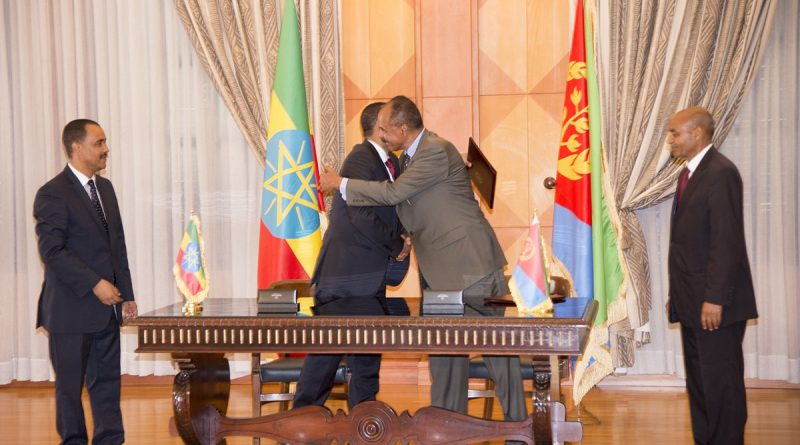Ethiopia; Eritrea Make Peace After 20 Years of Conflict
By Jarrett Dang
Staff Writer
Ethiopian Prime Minister Abiy Ahmed and Eritrean President Isaias Afwerki signed a peace agreement on September 16 in Jedda, Saudi Arabia solidifying new diplomatic ties between the two nations, reports Al Jazeera. The two nations had previously been stuck in a military stalemate for 20 years after a border conflict erupted in 1998. The treaty comes as the culmination of months of effort by Ethiopian and Eritrean leaders to normalize relations.
Africa News reports that the seven-point agreement, titled, “Agreement on Peace, Friendship and Comprehensive Cooperation Between the Federal Democratic Republic of Ethiopia and the State of Eritrea”, includes provisions such as “The state of war between the two countries has ended and a new era of peace, friendship and comprehensive cooperation has started.” It also states, “The two countries will develop Joint Investment Projects, including the establishment of Joint Special Economic Zones”.
War broke out between the two countries in 1998, five years after Eritrea gained independence from Ethiopia, over contested areas along the border. However, the disputed areas ostensibly had no real value to either side; ; The Economist described the situation as being like “two bald men fighting over a comb.” A peace agreement was signed in Algiers in late 2000 that was supposed to end hostilities, but each side remained belligerent to the other and bilateral relations bottomed out. In addition to closing embassies and barring flights, both nations shut their borders and camped armies on their respective sides.
Abiy Ahmed, elected as the Prime Minister of Ethiopia in April 2018, has made huge strides in improving ties between his country and Eritrea since assuming office. Ahmed’s government conceded the contested town of Badme as well as other disputed areas and called for Eritreans to consider bilateral peace talks. On July 9, Ahmed took a trip to the Eritrean capital of Asmara and worked with President Afwerki to hammer out a five -point agreement that officially ended 20-year war, reports Reuters. Since then, the border and respective embassies between Ethiopia and Eritrea have been reopened, diplomatic telephone lines reconnected, and flights resumed, according to Al Jazeera.
Eritrea has also allowed Ethiopia to use some of its ports, a key factor for economic interests. In fact, 95 percent of the Ethiopian trade flows through Djibouti, according to Foreign Affairs. In September, an Ethiopian ship docked in an Eritrean port for the first time in 20 years, states an additional report from Reuters. Previously existing trade routes have been reestablished, further increasing the prospects for greater economic integration.
Increased economic and security cooperation between Horn of Africa nations could stabilize the region as a whole. The peace process between Eritrea and Ethiopia has inspired Eritrea to also seek reconciliation with Djibouti, which it fought briefly in 2008 over border disagreements. Eritrean President Afwerki has expressed openness to talks resolving this border dispute, according to an additional Africanews source.
A peaceful Ethiopian-Eritrean relationship could also stabilize the fragile nation of Somalia. In a 2007 analysis by Terrence Lyons published by the Council on Foreign Relations, Lyons argues that Somalian instability is partly the fault of the Ethiopian-Eritrean conflict, as Eritrea has allegedly supported terrorist organizations in Somalia. Increased security cooperation in the region, especially in the Somali conflict, could bring more peace and stability. The newfound peace between the two former adversaries is proving to have profound implications for the security and stability of the entire Horn of Africa.



